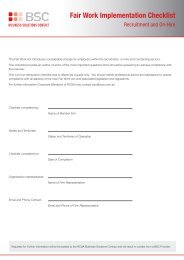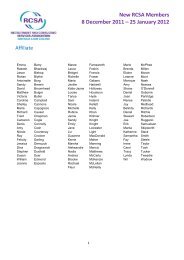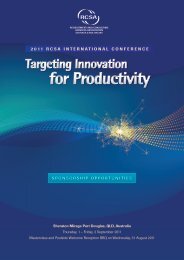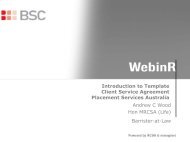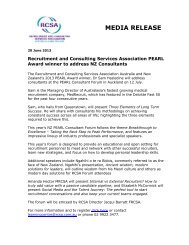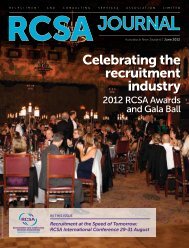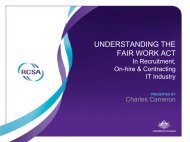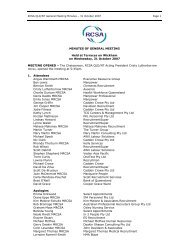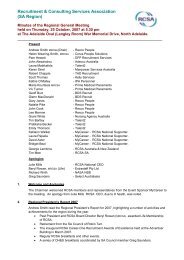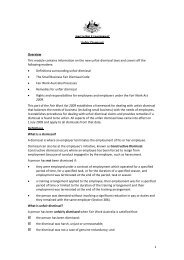Inquiry into the Workplace Relations Amendment - RCSA
Inquiry into the Workplace Relations Amendment - RCSA
Inquiry into the Workplace Relations Amendment - RCSA
Create successful ePaper yourself
Turn your PDF publications into a flip-book with our unique Google optimized e-Paper software.
Senate Employment, <strong>Workplace</strong> <strong>Relations</strong> and<br />
Education Legislation Committee<br />
<strong>Inquiry</strong> <strong>into</strong> <strong>the</strong> <strong>Workplace</strong> <strong>Relations</strong> <strong>Amendment</strong> (Work<br />
Choices) Bill 2005<br />
Submission of<br />
The Recruitment and Consulting Services Association<br />
November 2005<br />
<strong>RCSA</strong> Submission<br />
Senate <strong>Inquiry</strong> <strong>into</strong> <strong>Workplace</strong> <strong>Relations</strong> <strong>Amendment</strong> (Work Choices) Bill 2005<br />
1
The Recruitment and Consulting Services Association<br />
The Recruitment and Consulting Services Association Ltd (‘<strong>RCSA</strong>’) is <strong>the</strong> peak<br />
body of <strong>the</strong> employment services industry in Australia and New Zealand.<br />
Formed in 1996 <strong>the</strong> <strong>RCSA</strong> boasts a national membership of 3,000, all of which<br />
are drawn from a diverse range of organisations and individuals including small<br />
owner-operator businesses, listed and non-listed Australian companies and<br />
Australia’s large multinational corporations.<br />
Members of <strong>the</strong> <strong>RCSA</strong> provide an extensive range of employment services<br />
including:<br />
» On-hired employee services;<br />
» Contracting services (including on-hired independent contractors and direct<br />
contracting);<br />
» Recruitment services (including Job Network services); and<br />
» Employment consulting services (including workplace relations and OHS<br />
consulting services).<br />
The <strong>RCSA</strong> maintains its head office in Melbourne and six Secretariats located in<br />
Victoria, New South Wales, South Australia, Western Australia, Queensland and<br />
New Zealand. The current Chief Executive Officer of <strong>the</strong> <strong>RCSA</strong> is Mrs Julie Mills<br />
and <strong>the</strong> current President is Mr John Plummer (Executive Director, Chandler<br />
Macleod Group).<br />
The <strong>RCSA</strong> is instrumental in setting standards in <strong>the</strong> employment services<br />
industry. Such standards are set and maintained in relation to individual and<br />
corporate member professional development, education, training, industry<br />
compliance, industry performance and <strong>the</strong> establishment and maintenance of<br />
sustainable and effective legislative and regulatory regimes relevant to <strong>the</strong><br />
industry.<br />
The <strong>RCSA</strong> Australia/New Zealand boasts a very effective member committee<br />
structure that review and contribute to <strong>the</strong> establishment of professional conduct<br />
and equitable outcomes for corporate members, individual members, employees<br />
of corporate members (direct and on-hired) and independent contractors.<br />
Committees include <strong>the</strong> Australia/New Zealand <strong>Workplace</strong> <strong>Relations</strong> Committee,<br />
Australia/New Zealand Workers Compensation and Occupational Health and<br />
Safety Committee, Australia New Zealand Insurance Committee, Australia New<br />
Zealand Education and Training Committee and <strong>the</strong> Australia New Zealand<br />
Taxation Committee. This committee structure, which is supported by State<br />
based committees provides <strong>the</strong> <strong>RCSA</strong> with an unparalleled capacity to respond<br />
to discussions of this nature in a manner that is accurate, effective and insightful.<br />
<strong>RCSA</strong> Submission<br />
Senate <strong>Inquiry</strong> <strong>into</strong> <strong>Workplace</strong> <strong>Relations</strong> <strong>Amendment</strong> (Work Choices) Bill 2005<br />
2
Introduction<br />
The Recruitment and Consulting Services Association (‘<strong>RCSA</strong>’) represents<br />
Australia’s new workforce, a workforce where traditional direct hire employment<br />
makes way for third party employment services. The significant growth of third<br />
party employment services over <strong>the</strong> past ten years has primarily taken place in<br />
response to increasing international and domestic competition. Ever increasing<br />
international competition is a challenge that requires sensible yet sustained<br />
innovation from government, business and <strong>the</strong> Australian workforce. <strong>RCSA</strong><br />
support <strong>the</strong> government’s endeavours to establish <strong>the</strong> foundations for sustained<br />
economic development to support future generations and believes that workplace<br />
relations reform is one pillar upon which Australia’s sustainable future relies.<br />
<strong>RCSA</strong> have been strong advocates of a move to a unitary system of industrial<br />
relations within Australia given <strong>the</strong> propensity for members to operate across<br />
state borders and in multiple industries. The existence of multiple workplace<br />
relations systems within Australia has caused ongoing frustration for a<br />
membership that maintains one of Australia’s most diverse workforces. <strong>RCSA</strong><br />
also support <strong>the</strong> introduction of legislation that seeks to protect <strong>the</strong> right of<br />
business and government to utilise on-hired employee services without restriction<br />
from third parties. The imposition of restrictions on <strong>the</strong> use of this now vital<br />
element of <strong>the</strong> Australian business landscape only seeks to inhibit <strong>the</strong> capacity of<br />
business to compete in <strong>the</strong> global market.<br />
<strong>RCSA</strong> remains mindful that <strong>the</strong> government has prepared a bill that seeks to<br />
represent Australia’s future interests and that <strong>the</strong> ground work for ongoing<br />
prosperity must be formulated before <strong>the</strong> onset of market influences that may<br />
undermine <strong>the</strong> economic sustainability that has inspired much success in recent<br />
times.<br />
<strong>RCSA</strong> see that we as an industry have an ongoing responsibility to work closely<br />
with our employees as principal assets, clients as our future and o<strong>the</strong>r<br />
stakeholders as our partners to ensure that third party employment services<br />
achieve ongoing sustainability through fairness and innovation. We understand<br />
<strong>the</strong> importance of establishing employment relationships and systems of work<br />
that enhance <strong>the</strong> lives of our employees and <strong>the</strong> businesses of our clients and<br />
that economic prosperity is achieved through respect for all labour market<br />
participants.<br />
This submission only seeks to address those aspects of <strong>the</strong> Bill which we believe<br />
may benefit from closer scrutiny in relation to <strong>the</strong> employment services of our<br />
members. We remain mindful of <strong>the</strong> desire of <strong>the</strong> committee not to address<br />
issues that have previously been scrutinised before previous workplace relations<br />
inquiries.<br />
<strong>RCSA</strong> Submission<br />
Senate <strong>Inquiry</strong> <strong>into</strong> <strong>Workplace</strong> <strong>Relations</strong> <strong>Amendment</strong> (Work Choices) Bill 2005<br />
3
<strong>RCSA</strong> Submission in Response to <strong>the</strong> Bill<br />
Principal Objects<br />
1. <strong>RCSA</strong> supports <strong>the</strong> revision of <strong>the</strong> principal objects of <strong>the</strong> legislation to<br />
provide greater attention to Australia’s flexible workforce. <strong>RCSA</strong> is <strong>the</strong><br />
peak industry body representing on-hired employee services in Australia<br />
and advocates improved recognition and understanding of <strong>the</strong> need for<br />
flexible employment solutions to meet <strong>the</strong> changing needs of business and<br />
government.<br />
2. <strong>RCSA</strong> supports <strong>the</strong> establishment and maintenance of a single system of<br />
workplace relations within Australia. <strong>RCSA</strong> believes <strong>the</strong> establishment of<br />
a single system of workplace relations will allow members of <strong>the</strong><br />
association to focus more upon o<strong>the</strong>r compliance activities such as<br />
occupational health and safety and equal employment opportunity by<br />
reducing <strong>the</strong> duplication of industrial instruments across industry and<br />
occupation. <strong>RCSA</strong> members maintain a high level of diversity amongst<br />
<strong>the</strong>ir respective workforces and <strong>the</strong> move toward a unitary system of<br />
workplace relations management will improve compliance and simplify<br />
candidate and worker understanding of <strong>the</strong>ir respective entitlements.<br />
3. <strong>RCSA</strong> supports improved means of investigation and enforcement to<br />
ensure compliance with newly established minimum entitlements under<br />
<strong>the</strong> Bill. <strong>RCSA</strong> supports <strong>the</strong> right and capacity of direct hire and on hired<br />
employees to address grievances through a fully funded government body.<br />
4. <strong>RCSA</strong> supports <strong>the</strong> focus upon <strong>the</strong> balancing of work and family through<br />
<strong>the</strong> establishment of more flexible work arrangements including <strong>the</strong><br />
utilisation of on-hired employment to enter and re-enter <strong>the</strong> workforce<br />
whilst maintaining a capacity to respect work/life balance.<br />
The Australian Fair Pay Commission and Standard<br />
1. <strong>RCSA</strong> submits that it is essential that <strong>the</strong> office of <strong>the</strong> Australian Fair Pay<br />
Commission retains integrity through independence from <strong>the</strong> government<br />
of <strong>the</strong> day. The success of <strong>the</strong> Australian Fair Pay Commission now and<br />
<strong>into</strong> <strong>the</strong> future will be determined by its capacity to make decisions without<br />
influence.<br />
2. <strong>RCSA</strong> support <strong>the</strong> introduction of Fair Pay Standards to ensure a<br />
minimum entitlement for employees working under <strong>the</strong> broader Federal<br />
system of workplace relations. <strong>RCSA</strong> recognise <strong>the</strong> importance of<br />
assisting members to enter <strong>into</strong> agreements with direct hire and on-hired<br />
employees that provide terms and conditions of employment that<br />
<strong>RCSA</strong> Submission<br />
Senate <strong>Inquiry</strong> <strong>into</strong> <strong>Workplace</strong> <strong>Relations</strong> <strong>Amendment</strong> (Work Choices) Bill 2005<br />
4
complement <strong>the</strong> flexible work arrangements required of <strong>the</strong> contemporary<br />
worker wishing to maintain diversity and life balance in <strong>the</strong>ir employment<br />
arrangements. <strong>RCSA</strong> fur<strong>the</strong>r recognise that <strong>the</strong> Australian Fair Pay<br />
Standard is a minimum and that effective workplace relations will require<br />
more comprehensive terms and conditions of employment to cater for <strong>the</strong><br />
personal and enterprise needs of <strong>the</strong> employment service provider in a<br />
way that also caters for client operations.<br />
3. <strong>RCSA</strong> support <strong>the</strong> introduction of unpaid carer’s leave entitlements for<br />
casual employees. For some time now <strong>RCSA</strong> has recognised <strong>the</strong><br />
importance of recognising <strong>the</strong> need to cater for <strong>the</strong> rights of all employees<br />
in relation to family and related responsibilities. The introduction of an<br />
entitlement to unpaid carer’s leave will fur<strong>the</strong>r facilitate <strong>the</strong> sustainability of<br />
casual employment as an option for employees wishing to maintain<br />
work/life balance and flexibility.<br />
4. <strong>RCSA</strong> is concerned that <strong>the</strong> casual loading standard provided at section<br />
90H requires a minimum casual loading which may fail to take <strong>into</strong><br />
account <strong>the</strong> provision of additional annual leave entitlements for casual<br />
employees under an award where existing casual loadings are below 20%<br />
and <strong>the</strong> provision of such annual leave component takes <strong>the</strong> total loading<br />
beyond 20%.<br />
5. <strong>RCSA</strong> support <strong>the</strong> introduction of parental leave entitlements for casual<br />
employees with 12 months regular and ongoing employment and believe<br />
such provisions provide for <strong>the</strong> sustainability of casual employment<br />
especially as it may relate to on-hired employment through an on-hired<br />
employee service provider. However, <strong>RCSA</strong> is concerned that members<br />
engaging on-hired employees may be unable to guarantee a return to <strong>the</strong><br />
same position and client assignment upon return from such leave. <strong>RCSA</strong><br />
seeks that <strong>the</strong> provisions of proposed sub-sections 94R(5), 94ZH(3) and<br />
94ZZ(3) relating to inability of an employer to return a returning employee<br />
to <strong>the</strong> position held immediately prior to <strong>the</strong> taking of leave recognises <strong>the</strong><br />
incapacity of on-hired employee service providers to direct a client to take<br />
a returning employee on assignment as an on-hired employee pursuant to<br />
sub-sections 94(5)(a) and (b), 94ZH(3)(a) and (b) and 94ZZ(3)(a) and (b).<br />
6. We maintain a range of queries in relation to minimum standards and <strong>the</strong><br />
award review which include <strong>the</strong> following:<br />
Will <strong>the</strong> AFPC consult with employer associations and interested<br />
parties with respect to <strong>the</strong> setting of <strong>the</strong> Award classification wages,<br />
<strong>the</strong> Federal Minimum Wage (FMW), <strong>the</strong> minimum wage for juniors and<br />
in <strong>the</strong> setting of <strong>the</strong> default casual rate<br />
<strong>RCSA</strong> Submission<br />
Senate <strong>Inquiry</strong> <strong>into</strong> <strong>Workplace</strong> <strong>Relations</strong> <strong>Amendment</strong> (Work Choices) Bill 2005<br />
5
What criteria will <strong>the</strong> AFPC and <strong>the</strong> Awards Review Taskforce use to<br />
assess <strong>the</strong> default casual rate (proposed at 20%) Will <strong>the</strong> “Standard”<br />
be adjusted or reviewed at appropriate intervals<br />
Will <strong>the</strong> AFPC only set minimum casual loadings, or will <strong>the</strong> default<br />
casual loading basically apply across all Awards.<br />
With <strong>the</strong> removal of <strong>the</strong> no-disadvantage test, how will <strong>the</strong> default<br />
casual loadings take <strong>into</strong> consideration some over Award allowances<br />
and leave accruals in addition to <strong>the</strong> existing casual rate<br />
Regarding organisations that do not enter <strong>into</strong> AWA’s or certified<br />
agreements and are not constitutional corporations following <strong>the</strong><br />
ending of <strong>the</strong> transitional period, will <strong>the</strong>y be covered by <strong>the</strong> new<br />
minimum Federal Award provision or refer back to <strong>the</strong> relevant state<br />
based Awards<br />
<strong>Workplace</strong> Agreements and Awards<br />
1. <strong>RCSA</strong> supports <strong>the</strong> introduction of a simplified approach to agreement<br />
making whereby agreements take effect from lodgment ra<strong>the</strong>r than<br />
approval by <strong>the</strong> Office of <strong>the</strong> Employment Advocate. However <strong>RCSA</strong><br />
submits that it is imperative that <strong>the</strong> Office of <strong>the</strong> Employment Advocate is<br />
fully funded and has <strong>the</strong> capacity to efficiently handle its new agreement<br />
making responsibilities.<br />
2. <strong>RCSA</strong> is concerned that <strong>the</strong> maximum term of Union or Employer<br />
greenfields agreements at 12 months on <strong>the</strong> basis that 12 months is too<br />
restrictive and fails to cater for <strong>the</strong> particular requirements of on-hired<br />
employee service providers that in certain circumstances may require an<br />
agreement for new client arrangements over an extended period.<br />
3. <strong>RCSA</strong> strongly support <strong>the</strong> introduction of legislation that prohibits <strong>the</strong><br />
lodgement of agreements or operation of award clauses which seek to<br />
place restriction on <strong>the</strong> engagement of on-hired employees and<br />
contractors.<br />
Industrial Action<br />
1. <strong>RCSA</strong> supports <strong>the</strong> restrictions on pattern bargaining introduced by <strong>the</strong><br />
proposed legislation. However, we seek clarification that circumstances<br />
where an on-hired employee service provider enters <strong>into</strong> an agreement<br />
that reflects <strong>the</strong> terms and conditions of principal terms of a client<br />
agreement will not be considered ‘pattern bargaining’.<br />
<strong>RCSA</strong> Submission<br />
Senate <strong>Inquiry</strong> <strong>into</strong> <strong>Workplace</strong> <strong>Relations</strong> <strong>Amendment</strong> (Work Choices) Bill 2005<br />
6
Transition to Unitary System<br />
1. <strong>RCSA</strong> strongly supports <strong>the</strong> move toward a unitary system of workplace<br />
relations in Australia on <strong>the</strong> basis that we believe one system of workplace<br />
relations within Australia will improve <strong>the</strong> capacity of our members to<br />
comply with <strong>the</strong> relevant award or legislative provisions relating to unfair<br />
dismissal and unlawful termination.<br />
<strong>RCSA</strong> Submission<br />
Senate <strong>Inquiry</strong> <strong>into</strong> <strong>Workplace</strong> <strong>Relations</strong> <strong>Amendment</strong> (Work Choices) Bill 2005<br />
7



